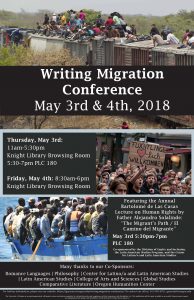Writing Migration Conference
The Department of German & Scandinavian is hosting a conference this week!
Sessions will be held:
- May 3rd, from 11:00 AM to 5:00 PM, in the Browsing Room of the Knight Library.
- May 3rd there will also be a special session from 5:30 PM to 7:00 PM in PLC 180. In this exceptional session we have the honor of hosting and attending the Annual Bartolomé de la Casas Lecture on Human Rights, to be given by Father Alejandro Solalinde, an important human rights activist and intellectual guiding light, who will be speaking on “The Migrant’s Path/El Camino del Migrante.”
- May 4th, from 9:00 AM to 5:00 PM, in the Browsing Room of the Knight Library.
- All events are free and open to the public. The session schedule is on our website: https://gerscan.uoregon.edu/writing-migration-conference/
We live in an age of mass migrations, on the one hand an effect of the economic, political, and cultural processes of globalization (which include post-colonial and neo-colonial developments), and on the other hand a consequence of the increasingly destabilizing effects of global climate change. These migrations involve both immense suffering on the part of the migrants themselves, and challenges for “host”-nations, but also the potential for cultural innovation and human emancipation, as new voices enter spaces where they had been previously unheard, producing the broadening of intercultural understanding.
In light of the importance of these global migrations, with a special focus on migrations into the US and into Europe, and in order to provide, in our own community, an informative and reflective counter-voice to the anti-migrant sentiment and ideology that are currently making themselves felt in both North America and Europe, we conceived of a conference that would address various migration phenomena, experiences, and contexts.
As cultural studies scholars with literary and philosophical interests, more specifically, we have organized this interdisciplinary conference largely around literary and philosophical presentations of migration, including the migrations of literary forms themselves. Yet we have mixed these presentations with those from the realms of activism and from the historiography of the present, in order to keep the political-social focus clear. Talks will address themes as diverse as: the contemporary political situation on the US-Mexican border, especially concerning TPS status; contemporary migration writing (and literary migration) in the US, Germany, Sweden, North Africa, and France; Mexican-American colonial culture in the 18th century; and the representation of seventeenth century war-induced migration in post-World War II German drama.
